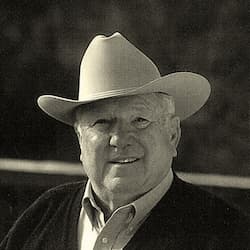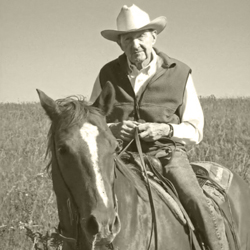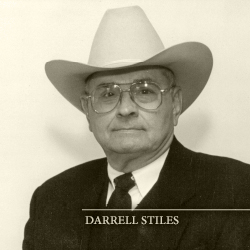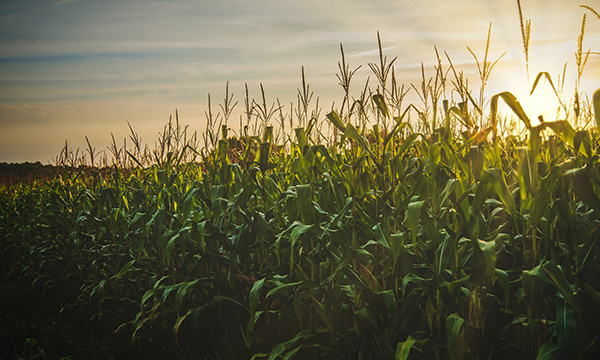Step into the rich tapestry of Oklahoma's agricultural history, where the spirit of the land and the resilience of its people intertwine. In this educational journey, we delve into the captivating narratives of three distinguished agriculturists—John Hughes, Frederick F. Drummond, and Darrell Stiles—who have left an indelible mark on the state's farming and ranching landscape.
These tales go beyond the pages of history; they are living testimonies to the challenges and triumphs of those who have cultivated the soil beneath the Oklahoma sun.
John Hughes
John Hughes was born on May 16th, 1933 in Bartlesville Oklahoma to Arthur Middleton Hughes and Elsie Tyson Hughes. His father, who worked for Phillips Petroleum Company, fulfilled a long-held dream of owning a ranch in 1938. Initially purchasing 1440 acres from the Union National Bank, the ranch eventually grew to 12,000 deeded acres through various acquisitions.
The ranch included Osage Indian leases, providing surface grazing rights rather than mineral rights. In 1975, the size of the ranch was doubled when John purchased the adjacent land from Frank Phillips’ (the founder of the Phillips Petroleum company) cow ranch – contributing to its prominence in the Bartlesville area.
This allowed the family to expand its reach in the cattle industry, and John Hughes has personally experienced the different ups and downs of farming pigs, cattle, and poultry. Furthermore, the Hughes Ranch has been involved in pasturing and adopting wild horses for the Bureau of Land Management for over 20 years as of 2024.
One of the main reasons John Hughes and his family have seen such success over the years is Oklahoma’s predictable grazing seasons. Over his 60-year career in ranching, there have only been two notable drought periods.
Because of John Hughes’ decades of experience with farming and ranching, he has a good handle on what’s to come in the future, telling would-be land managers the following:
“When he finished at Oklahoma State, he went on to TCU and went through their ranch management program. That was probably the best money I ever spent because that’s a tremendous program.”
— John Hughes
Chapter 14
Frederick F. Drummond
Fredrick F. Drummond was born on July 13th, 1931 to a storied family of Oklahoman ranchers – and like his father and grandfather before him, he preserved the state’s heritage of cultivating the area’s natural resources and conserving nature in Osage County. Later in life, he was inducted into the Oklahoma State University Hall of Fame.
Fred was always the type of person who would carry his family’s legacy, but as a third-generation rancher, he wasn’t always on the fast-track to inheriting the family’s business. Initially he pursued business at Harvard when he was sixteen, but returned to run the Hominy Trading Company after his father passed away.
Over time, he experienced many of the expected hazards and challenges of being a man out in nature – like breaking his neck as a cowboy but still enjoying the romance of working out in open pastures. He also recognizes that modern ranching may not be as viable as it once was, with many family ranches disappearing as they struggle with generating enough cash flow to maintain the business.
The business of ranching is fascinating yet requires a mind for innovation, and Fredrick understands that looking forward into the future is the key for success, telling young people that:
“I don’t think they’d be thinking about me. They’d be looking to their own future, John. Which is the way it should be. We learn from history, but you know, you can’t predicate your decisions on the past, you’ve got to look forward. So everybody is going to be looking forward, I hope, and planning to make this a better world.”
— Fredrick F. Drummond
Chapter 13
Darrell Stiles
The Stiles family is known to be part of the original homesteaders and pioneers around the first Land Run on April 22nd in 1889 – and Darrell Stiles is one in a long line of agriculturists, storytellers, and conservationists. Born on November 8th 1940, Darrel Stiles continues his family’s legacy by telling their story.
He tells it like this: During President Harrison’s five-day proclamation opening the second Fox Indian reservation and other lands for white settlement, the Stiles family fought for rights to own land with grit and a makeshift flag to mark their territory. It was a whole family affair, with sons and fathers staking claims to plots of land right next to each other.
The homesteader life was colorful and varied, and members of the Stiles family grew their own produce to survive through the winter, hunted and trapped local wildlife, and provided lumber to farmers and other settlers. In the fall, they would begin butchering chickens and pigs and developed better methods to keep the meat fresh over time.
While all of this was going on, Darrell’s great uncle George carried on to attend Oklahoma A&M College in the late 1800s to complete his studies in veterinary medicine. Other family members went on to distinguish themselves in their respective fields, with some remaining at the farm while others became sheriffs.
Despite many members of the family moving on to different vocations, the homesteader life endured in the Stiles clan – even when the Dust Bowl days and The Great Depression rolled around. With the generations of knowledge and experience in the family, Darrell has a bit of insight for future farmers:
“It’s a tough deal because if you don’t inherit a bunch of land, or have a bunch of them oil well jacks going up and down or submersible pumps down in the ground, it’s just really, really tough to make it. They have got loans now for young farmers, and things like that, but land prices are getting out of sight.”
— Darrell Stiles
Chapter 12
Sowing The Seeds of Wisdom
Oklahoma is known for many things – one of which is its rich natural resources that allow all kinds of life to flourish. Through the stories of John Hughes, Frederick F. Drummond, and Darrell Stiles, we’re able to see how humble beginnings can grow into massive legacies of farmers, ranchers, and agriculturists.
Through their tales, we see how nature, just like our lives, moves in cycles – and it's our resilience and adaptability that enable us to navigate these cycles. As we sow the seeds of wisdom gleaned from Hughes, Drummond, and Stiles, let their stories be a compass for the agricultural stewards of tomorrow.
In their legacies, we find a mosaic of experiences that not only shape the past but serve as guiding stars for a future where the land thrives, the people endure, and the spirit of Oklahoma's agriculture continues to flourish.


